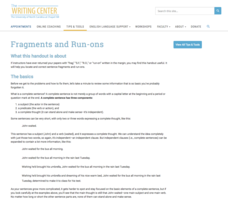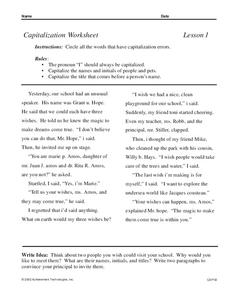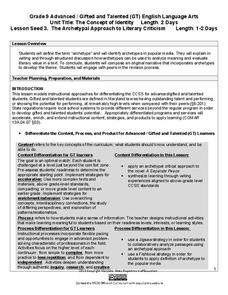Social Media Toolbox
Social Media Plan
It's gameplan time! Journalism scholars create a social media plan based upon work completed in previous lessons. The activity, fifth in a 16-part Social Media Toolbox series, focuses on using data and consensus to create an effective...
Social Media Toolbox
Social Media Survey
Survey says ... social media is here to stay! How do the pupils in your school use social media? Using lesson four from a 16-part series, The Social Media Toolbox, learners study surveys and create their own. The resource includes...
Social Media Toolbox
Cyberbullying
What can we do to make our school community more aware of cyberbullying? From The Social Media Toolbox, lesson 10 of 16 takes on the tough topic of bullying. Learners research cyberbullying through online research, then create an...
Social Media Toolbox
Social Media Roles
Social media has changed the news publishing process, so how does it affect school news publications? Lesson nine in a 16-part series titled The Social Media Toolbox explores the traditional publishing roles through the lens of social...
Social Media Toolbox
A Look at Social Media Policies
Should school news publications use social media if their district is against the use of social media in school? Pupils ponder the policy, then examine their publication's plan in parts seven and eight of a 16-part Social Media Toolbox...
Social Media Toolbox
Law Review
How can your journalism class ensure they use social media responsibly and legally? The sixth lesson in a 16-part Social Media Toolbox series asks pupils to dig deep into the legal aspects of social media use by school publications....
Social Media Toolbox
Social Media Usage
Is there a difference in the way organizations present news via social media and in print? The third in a series of 16 lessons from The Social Media Toolbox explores news outlets and their delivery methods. Groups follow a story for a...
Social Media Toolbox
Why Social Media?
Is social media the best way to convey news in your school? Young journalists dig deep into the social media question in the second of 16 lessons from The Social Media Toolbox. After learning about the relationship between social media...
Social Media Toolbox
Ethical Decision Making
When faced with a dilemma, how do journalists decide how much news to use? Social media scholars explore the philosophies of ethical resolution in the first of a 16-part Social Media Toolbox series. Partnered pupils use a Potter Box to...
California Department of Education
Etiquette? What’s That?
Business etiquette is a big deal! Are your scholars prepared to impress in the business world? The third in a series of six college and career readiness lessons focuses on basic behaviors in business situations. Groups research specific...
California Department of Education
Writing Right
Does your class have the write stuff? Young career seekers try their hand at composing business letters in the second of six career and college readiness lesson plans for seniors. Pupils practice writing cover letters, thank you notes,...
California Department of Education
What Occupation Interests Me?
Is the secret to success turning an interest into a career? Eleventh graders explore the occupation-interest connection in a career education lesson. Individuals first take an interest inventory and then create a presentation about a...
California Department of Education
My Best Resume
For employers and recruiters, the first step in their quest to find good candidates is the paper screening process. They look at a candidate's application and resume and push forward the files of those who meet their requirements. Thus...
University of North Carolina
Verb Tenses
Twelve categories of verbs exist in the future tense, ranging from simple present to future perfect progressive, but only three have a place in academic writing. Those three tenses make up the content of an informational handout that...
University of North Carolina
Fragments and Run-ons
English teachers around the world cringe when they come across fragments and run-ons in papers. A handout on these poor imitations of sentences helps bring relief by reviewing the basics of sentence construction and by offering...
National Endowment for the Humanities
The New Order for "Greater East Asia"
Sometimes the New Order becomes synonymous with its implications for European countries, but what about its consequences for East Asia? The final instructional activity in a four-part series teaches scholars about World War II. High...
National Endowment for the Humanities
Victory and the New Order in Europe
A New Order in Europe calls for a new lesson plan! This third plan in a series of four sequential lessons encourages high schoolers to read primary sources about the development of the New Order and follow up their knowledge with a...
National Endowment for the Humanities
How to Win a World War
High schoolers are have begun to learn the art of diplomacy with each other, but do they understand how diplomacy works at a global level? The second in a series of four lessons, guides scholars in evaluating primary sources. The why...
National Endowment for the Humanities
How "Grand" and "Allied" Was the Grand Alliance?
Learn more about the Grand Alliance with a scaffolded lesson plan that includes four activities. Class members use primary sources to complete a map exercise, understand the goals and objectives of each individual nation, and participate...
The New York Times
I Don’t Think So: Writing Effective Counterarguments
When it comes to writing effective arguments, writers must do more than simply make a claim, counterarguments must be considered. Aspiring writers analyze counterarguments in editorials, and then learn how to write counterarguments in...
Curated OER
Fear, and Conquering Fear
The Lord of the Flies and The Kite Runner are the core texts in a unit that asks learners to examine various texts that show how fear can be a destructive force or it can be an agent of change. Individuals they design a project that...
Achievement Technologies
Language Arts Worksheets
Looking for some quick grammar warm-ups? What about handy spelling crossword puzzles? Find everything you need with a resource that contains practice worksheets for parts of speech, parts of a sentence, common grammatical errors, tricky...
Syracuse City School District
Capitalization and Punctuation
How many of the pupils in your language arts class can differentiate between a colon and a semicolon? Clarify common conventions, including end punctuation, proper capitalization, and sentence structure, with a series of helpful grammar...
Maryland Department of Education
The Concept of Identity Lesson 3: The Archetypal Approach to Literary Criticism
As class members continue their study of approaches to literary criticism, readers examine the symbolism and archetypal patterns in John Knowles' A Separate Peace, and how these parallels are used to develop a theme in the story.

























